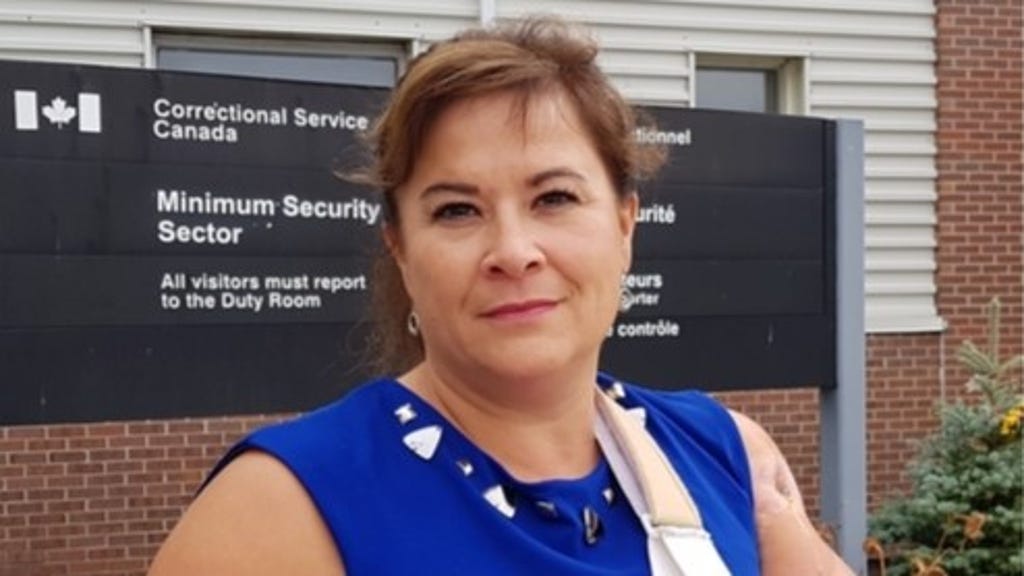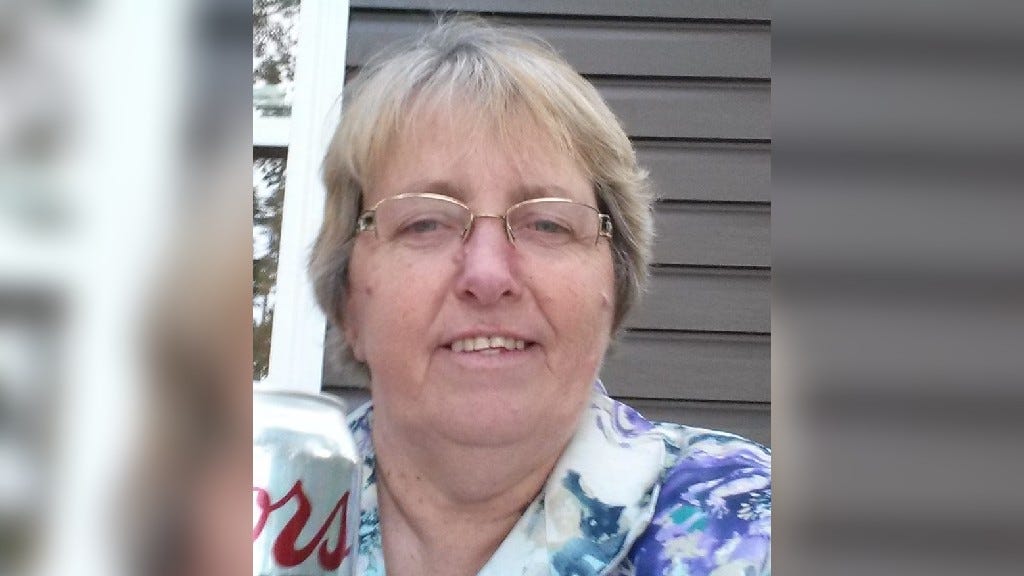Corrections silenced me - shooting victim
Beth Wallace, who was shot and almost killed 10 years ago, says corrections officials prohibited her from revealing attacker was out of prison or warning others of risk
Beth Wallace’s life was turned upside down a decade ago when a man she’d rejected as a romantic partner tried to kill her and robbed her of the use of her left arm.
Now she feels victimized all over again - not because the man who intended to kill her has been released from prison, but because federal corrections officials silenced her.
Benjamin Darren Nason, 48, formerly of Beaver Dam outside Fredericton, was convicted of attempted murder in late 2013 after he’d showed up at Wallace’s Lincoln Heights home in the middle of the night Jan. 29, 2013, with a high-powered rifle.

He shot at her twice as she fled from the house, striking her once in the upper left arm, inflicting devastating and life-threatening injury.
While doctors were able to save her arm, she’s never regained use of it.
Nason was released from prison July 4 after attaining his statutory release date, a standard release mandated by legislation overseeing federal correctional services.
Wallace told the Fredericton Independent that Nason’s release didn’t come as a shock, as she’d been advised of it some time ago.
“[Correctional Service Canada] had prepared me for this automatic two-thirds of his sentence release, and I was aware of the date for a long time,” she said.
“I don’t agree with it, but I accept it as a part of the justice and criminal systems in Canada.”
What floored her was how the Correctional Service Canada (CSC) officials with whom she interacted treated her in light of Nason’s impending release and how parole officials disregarded concerns for her safety.
“One of the biggest upsets came from the CSC protocols and processes, as usual,” Wallace said.
“Not the staff, but the guidelines they need to follow and ensure I am aware of.”
While she was advised of when Nason was being released, the conditions to which he’s subject and the area in which he was residing, she said, she was expressly told she couldn’t share that information with anyone who wasn’t registered as a victim in the case.
That’s a short list, but Wallace said the violence Nason unleashed upon her that cold winter night more than 10 years ago reverberated throughout her former neighbourhood and among her family, friends and co-workers.
“I pleaded with Corrections Canada to tell those affected by Ben’s horrific acts, and those who needed to know that they could run into him unexpectedly, but I was denied repeatedly,” she said.
“I even asked if I could send a list of people’s names and contact info to them so they could advise them, including police and security where I work, but was told only registered victims could know.”
The Fredericton Independent, which had registered with the Parole Board of Canada for updates on Nason’s case, received a copy of its decision regarding conditions for his statutory release earlier this month.
With that in hand, this journalist reached out to Wallace for comment.
She said that contact came as a relief, knowing the news of Nason’s release would be made public.
But it shouldn’t have fallen to a reporter to let the world know that Nason was out, she added.
The initial article on Nason’s release “is how my family and all the unregistered victims, police and my support systems are learning of this news,” Wallace said.
“My family is very upset and learning this way has been horrible for everyone.”
Shelley Lawrence, a CSC spokesperson for the Atlantic region, said the federal agency is committed to respecting and upholding victims’ rights, subject to the directives and priorities outlined in the Corrections and Conditional Release Act (CCRA) and the Canadian Victims Bill of Rights.
“Our goal is always to provide information that is helpful in enabling victims prepare for events related to an offender, using a trauma-informed approach,” she wrote in an email.
“We follow the law in what information we can disclose to registered victims of crime and this information is protected under the Privacy Act. While the Corrections and Conditional Release Act affords this access to victims, we must weigh the need to disclose information in our possession more broadly.”
Lawrence cited Section 26 of the CCRA, which governs CSC’s duties when it comes to disclosing information to victims.
It outlines what details must be disclosed to registered victims and what can be, given circumstances of a case and the determinations of corrections officials. However, it says nothing about restrictions on victims to disclose what they learn to others.
In response to inquiries about what authority, if any, CSC or the Parole Board of Canada officials might have to tell victims not to reveal what they’ve been told about an offender’s release, conditions or location, Lawrence cited provincial legislation.
“Provincial laws that govern the right to privacy could apply should an individual publicly disclose the private information of another individual without their consent,” she wrote in an email.
However, that’s not true.
New Brunswick’s privacy legislation - the Right to Information and Protection of Privacy Act - imposes no obligations on private individuals, only provincial and municipal government agencies and other public-sector institutions, such as universities and colleges.
Lawrence said CSC keeps a close eye on offenders serving out the remainder of their sentences on statutory release in the community.
“Public safety is our top priority and offenders on statutory release in the community are closely monitored,” Lawrence wrote.
“We also work with policing partners, as needed.”
Lamenting location
Another issue for Wallace is where Nason is residing while on statutory release.
In its July 4 decision on his release conditions, the parole board prohibited Nason from going within a 75-kilometre radius of Fredericton.
He is permitted in New Brunswick in general and was released to a Saint John halfway house.
While that keeps Nason away from where Wallace now resides, she said it doesn’t provide for her safety.
“I cannot understand why he was placed so near to me or my family’s known residences, and areas I frequently visit for work,” she said.
Wallace travels around New Brunswick for her job and has property elsewhere in the province.
She said she pleaded with the parole board to exclude Nason from New Brunswick, and she doesn’t feel the 75-km restriction will prove effective.

In the July 4 decision, the parole board acknowledged it considered stronger restrictions, including a condition prohibiting Nason from being in New Brunswick.
“... However, it must balance its noted concerns with the fact that you have resided in an open, minimum-security institution within the same province for many years and, during that period, you have not attempted to initiate contact with the victim,” it said.
“Nevertheless, the board reminds you that any breach of this geographic restriction on your part, or any attempt to do so, should be viewed by CSC supervising authorities with the greatest concern.”
Wallace said what that decision fails to account for is the fact that Nason has a documented track record of ignoring or breaking rules while he was in prison.
In the same decision, she points out, the board expresses concern with Nason’s defiant attitude toward authority and failure to address his impulse-control problem, among other issues.
If he didn’t follow the rules while he was in prison, Wallace said, there’s no reason to expect he’s going to follow them on the outside.
Miranda Wallace, the victim’s niece, is one of those many people who have been wrestling with the fallout from what Nason did 10 years ago, though she’s not a registered victim and therefore wasn’t notified initially by CSC of his release.
In a post on Facebook, she spoke out about the fear and anger that are rippling throughout the family.
“... It seems like the system is broken. It feels like it caters more to criminals than to the victims. Ben Nason is now living in a halfway house in Moncton, New Brunswick, just 1.5 hours away from our city, a place we frequently visit,” she wrote.
“Despite having a no-contact order, it's alarming to know that he's so close, especially considering that even the authorities have labelled him as a high risk to reoffend. He's required to wear an ankle monitor, which only reinforces how dangerous he truly is.”
MIranda Wallace said she posted about this latest turn in the case because she feels it’s important for people to know Nason is out and to be aware of how the system doesn’t always put victims first.
“We cannot stay silent when someone like Ben Nason is released back into society, posing a potential threat to innocent lives,” she wrote.
“Change doesn’t happen, unless difficult conversations are had and people challenge those with the control to make a positive difference.”
Offender’s mother blames victim
Meanwhile, Wallace finds herself impugned by Benjamin Nason’s family.
On July 8, the day after the Fredericton Independent published the original piece on Nason’s release, a commenter going by the name “Martha Jones” on the Substack site posted a comment that stated, “Beth Wallace must have connections with someone in the parole board,” absurdly suggesting the victim got her way with regard to the conditions imposed on Nason for his statutory release.
The Independent removed the offending comment and investigated from where it originated.
It was discovered the email address associated with the profile was one associated with Brenda Nason, Benjamin’s mother.
The Fredericton Independent emailed her to explain why the comment was removed but also ask why the comment was posted in the first place and to give her the opportunity to explain for the purposes of this followup article.
Brenda Nason didn’t respond to that email, so a reporter called her.
She initially said she hadn’t seen that email, but during an interview, she later said she had read the email but didn’t understand what it was about.
Brenda Nason confirmed she had a connection to the name “Martha Jones,” explaining Martha is her middle name and Jones was her maiden name.
However, she denied she left the comment, noting she’d left the story open on her computer on the weekend in question.
She said there were a lot of family members over at her place at the time, all of whom know her middle and maiden names, and she speculated one of them must have seen the article and posted the comment.
“I have no idea who posted the comment, and I don’t care to ask,” she said.
Despite denying that she posted the comment, Nason nevertheless embraced its sentiment.
She said she believes Wallace might have had some sway with the parole board and made it harder for the man who tried to kill her to see his family.
“She has some clout,” Brenda Nason said. “They do everything she tells them.”
When it was pointed out that Wallace wanted her attacker to be barred from the province and clearly would prefer he was still in prison, Brenda Nason insisted it was the victim was out to get her son, not the other way around.
“I feel bad for her, for her situation, but I personally know Beth,” she said.
“She’s doing a lot of this to hurt my family.”
Wallace said Brenda Nason is pointing the finger at the wrong person.
“Ben’s choices and behaviours limited his accommodations and freedoms, not me,” she said.
Brenda Nason said the restriction keeping her son 75 km away from Fredericton means he can’t travel to the area to see his family and his own children.
“To me, it isn’t fair as a mother,” she said, noting she’s 70 and her husband is 76, so travelling to Saint John to see Ben is an ordeal. “Really, it’s punishing us.”
The Fredericton Independent suggested visiting Benjamin Nason in Saint John and spending time with him there was likely a better option than driving to see him in prison at Dorchester Penitentiary, but the offender’s mother said Correctional Service Canada mistreated her son and continues to do so.
She alleged he was seriously injured in Dorchester while working there and was denied medical treatment until she caused a fuss with an official in Ottawa. Brenda Nason declined to describe the nature or extent of the injury.
“He didn’t get assaulted,” she said.
Brenda Nason also said her son was recently moved out of the Saint John area, though she wouldn’t say to where. However, Miranda Wallace’s post on social media indicates he’s now at a halfway house in metro Moncton.
“They said they had a new development,” Brenda Nason said, noting officials wouldn’t tell her what it was.
Lawrence didn’t respond to an inquiry about what happened in Nason’s case to prompt the move to Moncton.
The violent offender’s mother said despite what the risk assessments say, her son poses no danger to Wallace.
“He’s learned his lesson,” she said, noting that just because he didn’t want to participate in “that psychology stuff” in prison doesn’t mean he’s still a threat.
“He just wants to get on with his life … He has no intention of going anywhere near Beth.”
‘The systems are broken’
Meanwhile, Beth Wallace said she’s at a loss on how to move forward with her life.
“I honestly don’t know where to go from here. I have been a vocal and involved victim making my opinions known when systems failed to support me, and advocating for changes to processes for those not as able or willing to,” she said.
“The systems are broken when barbarians who break in, assault, torture, attempt to murder and leave their wounded victim to die on icy cement steps on a -28 C night, show no remorse and are deemed as highly likely to reoffend are released to areas with housing and supports close to the victims and given freedoms the rest of us need to earn.”
Don MacPherson can be contacted at ftonindependent@gmail.com.





Excellent in-depth reporting, Don. Lots of angles and background to help make this sad story more complete. Readers can make up their own minds on the actions of the offender's family, but it's good to have the whole story.
And good on you for shining a very bright light on the foolish excuses of the CSC in warning the victim not to tell ANYONE that the offender was being released. That's ridiculous, and I'm glad you proved them wrong!
Great reporting Don. Investigative and in depth. Karissa Donkin at CBC is doing an investigative piece also on the misconduct of law enforcement. That will be a very interesting read. The system makes rules up as they go in some cases. Beth should have been able to warn anyone she felt needed to know to protect herself. She is correct, he didn’t follow the rules inside and he certainly won’t follow them outside either. I would agree with that assumption.